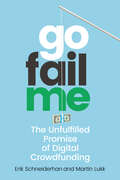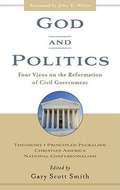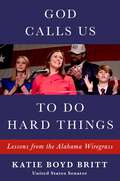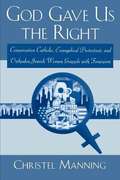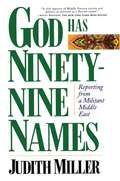- Table View
- List View
Gloster Javelin: An Operation History
by Michael NapierThe RAFs only delta-winged fighter the Gloster Javelin was also Britains first true All-Weather Fighter. Based in the UK and in Germany, the RAFs Javelin squadrons formed the front line of Britains air defences in the late 1950s and early 1960s. During this time Javelin crews pioneered the operational use of guided missiles and air-to-air refuelling by fighter aircraft. In the Far East, Javelins were involved in operations during the Indonesian Confrontation and the aircraft was also deployed to Zambia during the Rhodesian UDI Crisis. In this history, which is richly illustrated with many previously unpublished photographs, Michael Napier blends official records with personal accounts to describe the operational history of this iconic jet fighter.
Glowrushes
by Roberto PiuminiA beautiful, wise tale about imagination, chronic illness, and friendship for young readers by an Italy's foremost children's book author.&“I don&’t think I have read anything like this before – a tale of life, death, love and beauty. . . . I hope this unforgettable story finds all the readers it deserves.&” —Philip PullmanLong, long ago, a boy lies confined by sickness to his windowless bedchambers. He can never experience the outside world, never breathe fresh air or feel the warmth of the sun on his skin, so his doting father summons a painter to embellish his rooms with beautiful murals. The artist sets to work, and soon there is a fabulous world on the walls, a colorful, shifting landscape peopled by shepherds and lovers, criss-crossed by armies and pirate ships. As the boy&’s health fades, the artist paints on, turning the simple commission into a generous labor of love. Can he show this child the richness and beauty of the world—and of life itself—with nothing but paints and brushes? Glowrushes is a heartbreakingly beautiful classic of Italian children&’s literature.
Glubb Pasha and the Arab Legion: Britain, Jordan and the End of Empire in the Middle East
by Graham JevonDuring the 1950s, John Glubb and the Arab Legion became the 'cornerstone' of Britain's imperial presence in the Middle East. Based on unprecedented access to the unofficial archive of the Arab Legion, including a major accession of Glubb's private papers, Graham Jevon examines and revises Britain's post-1945 retreat from empire in the Middle East. Jevon details how Glubb's command of the Arab Legion secured British and Jordanian interests during the 1948 Arab-Israeli war, answering questions that have dogged historians of this conflict for decades. He reveals how the Arab Legion was transformed, by Cold War concerns, from an internal Jordanian security force to a quasi-division within the British Army. Jevon also sheds new light on the succession crisis following King Abdullah's assassination, and uses previously unseen documents to challenge accepted contentions concerning King Hussein's dismissal of Glubb, the 1956 Suez Crisis, and the nature of Britain's imperial decline.
Gnarr
by Jon GnarrIn the epicenter of the world financial crisis, a comedian launched a joke campaign that didn't seem so funny to the country's leading politicians . . .It all started when Jón Gnarr founded the Best Party in 2009 to satirize his country's political system. The financial collapse in Iceland had, after all, precipitated the world-wide meltdown, and fomented widespread protest over the country's leadership.Entering the race for mayor of Reykjavík, Iceland's capital, Gnarr promised to get the dinosaurs from Jurassic Park into downtown parks, free towels at public swimming pools, a "drug-free Parliament by 2020" . . . and he swore he'd break all his campaign promises.But then something strange started happening: his campaign began to succeed. And in the party's electoral debut, the Best Party emerged as the biggest winner. Gnarr promptly proposed a coalition government, although he ruled out partners who had not seen all five seasons of The Wire.And just like that, a man whose previous foreign-relations experience consisted of a radio show (in which he regularly crank-called the White House and police stations in the Bronx to see if they had found his lost wallet) was soon meeting international leaders and being taken seriously as the mayor of a European capital.Here, Gnarr recounts how it all happened and, with admirable candor, describes his vision of a more enlightened politics for the future. The point, he writes, is not to be afraid to get involved--or to take on the system.
Gnomon (Deutsch)
by Melina Wilke Luchia DertienEmile Delaurier ist ein wunderbar militanter Revolutionär, ein Leuchtfeuer der Gerechtigkeit für die ganze Welt. Für Renaire, einen Künstler im stetigen Kampf gegen die Flasche, war es Besessenheit auf den ersten Blick. Seine Hingabe hat zu zwei Jahren tödlicher Partnerschaft geführt, bei der Renaire Delaurier auf seinem unbarmherzigen Weg zur Gleichheit wie ein mörderischer Robin Hood gefolgt ist. Doch dann ändert Delaurier plötzlich sein Muster und nimmt Renaire mit nach Russland, um eine Journalistin ohne jede unmoralische Vergangenheit zu töten, und ohne seine Tat zu erklären. Als Interpol Kontakt zu Renaire aufnimmt, hat er eigentlich schon genug Probleme – Delaurier am Leben erhalten, mit ihrer veränderten Beziehung klarkommen und seine eigene Vergangenheit überleben, die ihn immer noch verfolgt. Doch als er erfährt, was Interpol von ihm will, muss Renaire der Wahrheit über Delaurier ins Gesicht sehen: dass ein edler Mann nicht immer ein guter Mann ist. Er steht vor einer Entscheidung, die kein Mann jemals treffen sollte – soll er seinem Herzen oder seiner Moral folgen?
Go Back to Where You Came From: The Backlash Against Immigration and the Fate of Western Democracy
by Sasha Polakow-SuranskyWhat if the new far right poses a graver threat to liberal democracy than jihadists or mass migration?Brexit and Donald Trump's victory were just the beginning--and Marine Le Pen's defeat does not signal a turning of the tide. --From the IntroductionFrom Europe to the United States, opportunistic politicians have exploited the economic crisis, terrorist attacks, and an unprecedented influx of refugees to bring hateful and reactionary views from the margins of political discourse into the mainstream. They have won the votes of workers, women, gays, and Jews; turned openly xenophobic ideas into state policy; and pulled besieged centrist parties to the right. How did we get here?In this deeply reported account, Sasha Polakow-Suransky provides a front-row seat to the anger, desperation, and dissent that are driving some voters into the arms of the far right and stirring others to resist. He introduces readers to refugees in the Calais "Jungle" and the angry working-class neighbors who want them out; a World War II refugee-turned-rabbi who became a leading defender of Muslim immigrants; the children of Holocaust survivors who have become apologists for the new right; and alt-right activists and the intellectuals who enable them.Polakow-Suransky chronicles how the backlash against refugees and immigrants has reshaped our political landscape. Ultimately, he argues that the greatest threat comes not from outside, but from within--even established democracies are at risk of betraying their core values and falling apart.
Go Fish: How To Win Contempt And Influence People
by Mr Fish"Mr. Fish dissects the journalistic responsibility he faces as a cartoonist to make it make sense. It being his raw emotional output in response to a given stimuli (government, society, et al) manifesting itself via pen on paper without regard to the cleverly pointed punchline that will accompany and ultimately define it. . . The drawings are a celebration of the technical mastery and unbridled emotional truth of Dwayne Booth -- the Clark Kent to Superman's Mr. Fish."--Huffington Post"Fish's work makes you want to do something--even if you're not entirely sure what that something is--to change things for the better, and the feeling stays with you long after the book is closed."--Verbicide Magazine"Few individuals are as clued in to the volatility of the current political climate as iconic cartoonist Dwayne Booth (aka Mr. Fish). . . known for pointed and piquant single-panel cartoons that fearlessly and relentlessly take on the most sacred of cows in public life."--LA Weekly"A vibrant example of political cartooning as it is practiced at its heights... Anyone who thinks political cartooning is stale need only take a closer look at this body of work... Certifiably brilliant... The photographic elegance and immediacy with which this drawing is executed is typical of the most refined Mr. Fish style."--Los Angeles Review of BookThis debut volume of political cartoons from the revered Mr. Fish spans politics, popular culture, the economic crisis, the Obama presidency, and much more, where nobody--right, left, or middle--is safe from his razor-edged satire. The volume also includes original essays by Mr. Fish.Mr. Fish has been a freelance writer and cartoonist for eighteen years, publishing under both his real name (Dwayne Booth) and the penname of Mr. Fish with many of the nation's most reputable and prestigious magazines, journals, and newspapers. In addition to his weekly cartoon for Harper's and daily contributions to Truthdig.com, he has also contributed to the Los Angeles Times, the Village Voice, the LA Weekly, the Atlantic, the Huffington Post, Vanity Fair, Mother Jones, the Advocate, Z Magazine, the Utne Reader, Slate.com, MSNBC.com, and others.
Go Green: How to Build an Earth-Friendly Community
by Nancy H. TaylorGo Green is an indispensable resource for the grown-up greenies who have accepted the philosophy and are ready to spread it beyond just their own homes. Go Green offers user-friendly suggestions and case studies for individuals, schools, hospitals, businesses and communities on building or remodeling a green home, starting green programs in the classroom or at hospitals, and finding out what really matters about transportation, food, and renewable energy.
Go High: The Unstoppable Presence and Poise of Michelle Obama
by M. SweeneyA photographic celebration of the elegance and inspiring strength of former First Lady Michelle Obama.Featuring more than fifty full-color photographs illustrating her warmth, wisdom, and belief in a bright future, this one-of-a-kind collection highlights Michelle Obama’s compassion, verve, and dynamic approach to unifying people from all walks of life. Each picture is accompanied by some of her most compelling words—inspirational quotes sharing her earnest belief that the United States of America is a place of unity, fairness, vitality, and optimism.A perfect gift for mothers and graduates, Go High revisits the beloved first lady’s heartfelt embrace of the American people, and her persistent encouragement to always lift one another up, reach higher, and rise to the occasion.
Go Home or Die Here: Violence, Xenophobia and the Reinvention of Difference in South Africa
by Devan Pillay Shireen Hassim Pumla Dineo Gqola Noor Nieftagodien Daryl Glaser Tawana Kupe Eric Worby Alex Eliseev Rolf Maruping Stephen Gelb Loren Landau David Coplan Julia Hornberger Melinda Silverman Tanya Zack Anton Harber Cathi Albertyn Andile Mngxitama Véronique TadjoThe xenophobic attacks that started in Alexandra, Johannesburg in May 2008 before quickly spreading around the country caused an outcry across the world and raised many fundamental questions: Of what profound social malaise is xenophobia – and the violence that it inspires – a symptom? Have our economic and political choices created new forms of exclusion that fuel anger and distrust? What consequences does the emergence of xenophobia hold for the idea of an equal, non-racial society as symbolised by a democratic South Africa?On 28 May 2008 the Faculty of Humanities in the University of the Witwatersrand, Johannesburg convened an urgent colloquium that focused on searching for short and long-term solutions. Nearly twenty individuals – mostly Wits academics from a variety of disciplines, but also two student leaders, a journalist and a bishop – addressed the unfolding violence in ways that were conversant with the moment, yet rooted in scholarship and ongoing research.Go Home or Die Here emanates directly from the colloquium. It hopes to make sense of the nuances and trajectories of building a democratic society out of a deeply divided and conflictual past, in the conditions of global recession, heightening inequalities and future uncertainty. The authors hoped to pose questions that would lead both to research and to more informed, reflective forms of public action. With extensive photographs by award-winning photographer Alon Skuy, who covered the violence for The Times newspaper, the volume is passionate and engaged, and aims to stimulate reflection, debate and activism among concerned members of a broad public.
Go West Mr. President: Theodore Roosevelt's Great Loop Tour of 1903
by Michael F. BlakeIn 1903, Theodore Roosevelt planned a tour of the mid-West and Western states. It was dubbed the &“Great Loop Tour,&” being careful not to call it a campaign tour, although he intended to seek re-election the following year. Theodore was adamant that his speeches be devoid of any partisan rhetoric, nor would he meet solely with Republican office holders in the various cities and towns he planned to visit. He would happily shake hands with a Democratic mayor or Senator just as he would a Republican. Theodore&’s speeches, which he wrote himself, covered subjects of good citizenship, a square deal for every man, a strong navy, and the positive aspects of the recent irrigation bill he signed into law. Then there were his speeches relating to conservation of the land, forests, rivers, and wildlife. Nowhere did these subjects become more important to him than when he visited Yellowstone, the Grand Canyon and Yosemite. While he was still three years away from having the law that would knight him as the &“Conservation President,&” Theodore was already making his mark on preserving the country&’s resources.
Go Woke, Go Broke: The Inside Story of the Radicalization of Corporate America
by Charles GasparinoA New York Times bestselling author and veteran Fox Business financial journalist&’s explosive deep-dive into the progressive madness that has infected and corrupted the world&’s biggest corporations, threatening the stability of the global economy—and life as we know it. How did a bunch of rich dudes who run corporate America become the tools of left-wing radicals? Intimidated by activists on the left, virtually every major corporation in America has embraced woke politics. For years, these businesses could get away with progressive virtual signaling without worrying about alienating customers. Then the anti-woke counter-offensive movement arrived. As high-profile, disastrous backlashes at companies like Anheuser-Busch, Disney, Target and other companies reveal, companies who cave to the demands of left-wing social justice activists are being punished like never before. Customers are fighting back and taking their money elsewhere. In Go Woke, Go Broke, New York Times bestselling author and veteran financial journalist Charles Gasparino calls out the nonsense and takes readers inside the radicalization of corporate America, based on numerous insider interviews and exclusive reporting. The story is wilder than you can imagine. Gasparino introduces readers to America&’s most woke corporate leaders, tracing the origins of ESG and "stakeholder investing.&” He takes readers along on for a rollicking ride through corporate America as he shines a light, unlike anyone else, on Fortune 500 companies that have suffered for caving to the silly and irresponsible demands of social justice activists and left-wing interests. A respected financial reporter who has covered finance for more than 30 years, Gasparino is deeply sourced and has dug into countless episodes involving Wall Street greed, corporate hubris, and government overreach in enterprise. This explosive, untold story and in-depth examination of the seminal players, institutions, and forces of the markets shows that, for the sake of global stability, we must immediately pry the clenched fists of radical activists off the levers of the economy.
Go to School, You're a Little Black Boy: A Memoir
by Herb Shoveller Lincoln AlexanderAmong the important stories that need to be told about noteworthy Canadians, Lincoln Alexander’s sits at the top of the list. Born in Toronto in 1922, the son of a maid and a railway porter, Alexander embarked on an exemplary life path that has involved military service for his country, a successful political career, a thriving law career, and vocal advocacy on subjects ranging from antiracism to the importance of education. In this biography, Shoveller traces a remarkable series of events from Alexander’s early life to the present that helped shape the charismatic and influential leader whose impact continues to be felt today. From facing down racism to challenging the postwar Ontario establishment, becoming Canada’s first black member of Parliament, entertaining royalty as Ontario’s lieutenant-governor, and serving as chancellor of one of Canada’s leading universities, Alexander’s is the ultimate, uplifting Canadian success story, the embodiment of what defines Canada.
Go, Went, Gone
by Jenny Erpenbeck Susan BernofskyGo, Went, Gone is the masterful new novel by the acclaimed German writer Jenny Erpenbeck. The novel tells the tale of Richard, a retired classics professor who lives in Berlin. His wife has died, and he lives a routine existence until one day he spies some African refugees staging a hunger strike in Alexanderplatz. Curiosity turns to compassion and an inner transformation, as he visits their shelter, interviews them, and becomes embroiled in their harrowing fates. <p><p> Go, Went, Gone is a scathing indictment of Western policy toward the European refugee crisis, but also a touching portrait of a man who finds he has more in common with the Africans than he realizes. Exquisitely translated by Susan Bernofsky, Go, Went, Gone addresses one of the most pivotal issues of our time, facing it head-on in a voice that is both nostalgic and frightening.
GoFailMe: The Unfulfilled Promise of Digital Crowdfunding
by Erik Schneiderhan Martin LukkThe gaping holes in the U.S. and Canadian social safety nets mean that many people live in a state of financial precarity that can instantly become untenable in the face of another big expense, such as a large medical bill or damaged property. Historically, people have turned to their communities, neighbors, families, and loved ones for help in these situations. Today, asking for money on the internet through crowdfunding is among the most popular ways of seeking and donating to charity, and for-profit enterprises have realized that tapping into this instinct for helping is extremely good business. GoFailMe reveals how these sites, most notably GoFundMe, enjoy massive revenue, without providing the help they promise. They fail most of their users while putting them through an emotional rollercoaster and using sneaky tactics to obscure that reality. With unprecedented access to interviews, surveys, and hundreds of thousands of crowdfunding cases across North America, Erik Schneiderhan and Martin Lukk take on pressing questions with critical insight: When do we turn to others for help? Who succeeds and who fails in the digital crowd? Whom do these sites benefit? Ultimately, the failure of GoFundMe and others is emblematic of the inability of the for-profit sector and Big Tech to engineer an end to social inequality.
Goals and Means
by Jason Garner"Essential reading for anyone interested in the wider roots and antecedents of international syndicalism and anarchism."--David Welch, University of KentSpanish anarchism did not emerge, fully formed, on the eve of the fascist coup attempt and subsequent Civil War. In this detailed history of Spain in the decades leading up to the cataclysm, Jason Garner investigates what most other books simply assume: the conflicting forces, goals, and strategies that combined to create the country's libertarian movement.Jason Garner has taught at the University of Westminster and the University of Kent. He currently lives and teaches in Patagonia, Argentina.
Goat Song
by Konstantin VaginovTwo novels by one of the Soviet Union's most inventive writers, written in the tradition of Gogol and Dostoyevsky but with a twentieth-century, modernist edge.Konstantin Vaginov was an early and exemplary figure of Soviet modernist writing in all its agonized and glorious contradictions. Born into an educated middle-class family, Vaginov came of age with the Revolution. His novels of the late 1920s and early '30s are daringly experimental and tragically nostalgic, using mercilessly ironic prose to mourn the loss of prerevolutionary intellectual culture. Adrift in the brave new Soviet world, Vaginov's protagonists attempt to conjure the recent and distant past by stockpiling old books and songs, vulgar baubles and bad jokes, newspaper clippings, coins, and graffiti.This volume contains two novels: Goat Song features thinly veiled portraits of Vaginov's contemporaries as they flounder and self-destruct in their new bracingly materialist circumstances. Echoing Gogol, Dostoyevsky, and Bely, Goat Song is both a classic Petersburg city text and its swan song: "Now there is no Petersburg . . . the author is a coffin-maker by trade, not a cradle expert." Works and Days of Whistlin follows the novelist Whistlin as he unscrupulously mines the lives of his friends and fellow citizens for literary material. His exploitation of human material is a wry commentary on the concurrent efforts to industrialize and collectivize the Soviet economy, at a horrific human cost.
Gobernanza inteligente para el siglo XXI: Una vía intermedia entre Occidente y Oriente
by Nicolas Berggruen Nathan Gardels¿Cuál es la mejor forma de gobernar un mundo en profunda transformación? Un libro que analiza la unión de las mejores prácticas de gobierno en Oriente y Occidente como fórmula para afrontar los desafíos de la globalización Durante décadas la democracia liberal ha sido aplaudida como el mejor de los posibles sistemas de gobernanza. Sin embargo, esa categórica afirmación está hoy lejos de ser incuestionable. La democracia, en crisis en Occidente, debe probar su vigencia. En Occidente, argumentan Berggruen y Gardels, ya no vivimos en «democracias industriales», sino en «democracias consumistas» en las que se impone el cortoplacismo. En contraste, la visión a largo plazo de los líderes chinos empuja a su nación hacia el futuro. Pero China también se enfrenta a desafíos derivados de su meteórico ascenso. Su floreciente clase media cada vez exigirá más participación, mejores mecanismos de control de la responsabilidad política, elfreno a la corrupción y la ampliación del imperio de la ley. A medida que el siglo XXI avance, estos dos sistemas deberán competir con un mundo auténticamente multipolar en el que ninguna potencia domina en solitario. Para hacer frente a estos retos es necesario un nuevo sistema de «gobernanza inteligente» que delegue el poder e implique verdaderamente a los ciudadanos en las cuestiones que los afectan. Este oportuno libro es una guía tanto conceptual como práctica de los desafíos a los que se enfrenta la buena gobernanza en un mundo que se verá sometido a una profunda transformación en las próximas décadas. Comentarios:«Se sabe poco sobre los más recientes acontecimientos en China, en particular sobre el modo de pensar de los nuevos dirigentes chinos. En este libro, Nicolas Berggruen y Nathan Gardels resumen el pensamiento de algunas de las nuevas corrientes político-intelectuales que influencian a la generación que se aproxima al poder. Después de una exitosa transformación económica y de la creciente presencia de China en el mundo, será necesario adaptar el #socialismo armonioso#, propuesto por los nuevos dirigentes, a formas de cooperación internacional que permitan mayores convergencias entre Oriente y Occidente.»Fernando Henrique Cardoso, expresidente de Brasil «Un libro brillantemente agudo y provocador sobre el tema central de nuestro tiempo: la gobernanza efectiva. Las democracias y los sistemas autocráticos se encuentran en peligro de fracasar a gran escala. Berggruen y Gardels nos invitan valientemente, a nosotros y a la siguiente generación, a abordar este problema de frente, con humildad y con la mente abierta.»Michael Spence, premio Nobel de Economía, expresidente de la Comisión de Crecimiento y Desarrollo y autor de La convergencia inevitable «Berggruen y Gardels aportan una valiosísima visión de por qué nuestras democracias occidentales se han vuelto tan disfuncionales. Afirman que a menos que desarrollemos una perspectiva de gobernanza a largo plazo, la #democracia de consumo# actual socavará su propio futuro. Un brillante punto de partida para un debate que se necesita con urgencia: el de cómo nos gobernamos en esta nueva era.»Arianna Huffington, directora, Huffington Post/AOL «Berggruen y Gardels ofrecen una perspectiva poco convencional acerca de lo que debería significar la buena gobernanza en el siglo XXI, yendo más allá de las manidas explicaciones del tipo #Oriente contra Occidente# y ofreciendo algo mucho más convincente y pragmático».Eric Schmidt, presidente ejecutivo de Google
Gobierno: Attacracia
by Kwasi AttaEste libro trata de un tipo de Gobierno prescrito por Dios. Es preferible a la democracia y a todos los otros tipos de gobierno que el mundo ha experimentado. Fue rechazado por el pueblo de Israel porque eligió copiar a las naciones de su entorno. Este libro analiza sus características, ventajas, desventajas y cómo superarlas. El libro también analiza si se puede practicar hoy en día o no.
God And Politics: Four Views On The Reformation Of Civil Government
by Gary S. Smith16 contributors represent four positions on the biblical role of civil government. Originally delivered at a consultation on that topic, each of the four major papers is presented by a leading representative of that view and is followed by responses from the three other perspectives.
God Believes in Love: Straight Talk About Gay Marriage
by Gene RobinsonFrom the Bishop of the Diocese of New Hampshire in the Episcopal Church, the first openly gay person elected (in 2003) to the historic episcopate and the world's leading religious spokesperson for gay rights and gay marriage--a groundbreaking book that lovingly and persuasively makes the case for same-sex marriage using a commonsense, reasoned, religious argument, made by someone who holds the religious text of the Bible to be holy and sacred and the ensuing two millennia of church history to be relevant to the discussion, equally familiar with the secular and political debate going on in America today, and for whom same-sex marriage is a personal issue; Robinson was married to a woman for two decades and is a father of two children and has been married to a man for the last four years of a twenty-three-year relationship.
God Calls Us to Do Hard Things: Lessons from the Alabama Wiregrass
by Katie BrittThrough her life story, rising Republican star Senator Katie Britt shares some candid advice for how to overcome personal challenges, appreciate blessed moments, make our lives more fulfilling, and keep an unshakeable faith in God, family and our country. With grit and grace, Katie Britt has tackled a lot that life&’s thrown at her. From working in her parent&’s hardware store, to finding her path at the University of Alabama and marrying the captain of the football team, to an extremely close call with a tornado that destroyed her house while she held her baby in her arms, to her upstart campaign for the United States Senate, Britt has overcome setbacks, defied expectations and shocked the political establishment. So how did Britt become the youngest woman in the U.S. Senate? GOD CALLS US TO DO HARD THINGS offers the hard-earned lessons and common-sense advice that Britt gained from her experiences – and it&’s the kind of stuff many young folks need to hear. Topics and themes include: Focusing us on what you can control Being unafraid to fail – while also taking criticism and tough love Breaking past the limits we place on ourselves Being a change agent – not a title holder Sweating the small stuff of details and processes Warm, humble, and often lighthearted, GOD CALLS US TO DO HARD THINGS is about how a determined young woman decided to enter the arena and make her mark. At a moment when the political process feels so toxic and broken, Katie Britt proves that there&’s still a way to listen to your heart, serve, and inspire.
God Gave Us the Right: Conservative Catholic, Evangelical Protestant, and Orthodox Jewish Women Grapple with Feminism
by Christel J. ManningDrawing on two years of ethnographic research in Catholic, Evangelical Protestant, and Jewish communities, the author explores the diversity of views among women who have returned to tradition. Arguing that America has undergone profound cultural and economic changes in the last 30 years that have created tension between women's lives and traditional gender roles, she demonstrates how religious conservative women negotiate these tensions. Manning is an assistant professor of religion at Sacred Heart University. Annotation c. Book News, Inc., Portland, OR (booknews.com)
God Has Ninety-Nine Names
by Judith MillerA FIRST-HAND ACCOUNT OF THE STRUGGLE FOR POWER IN TODAY'S MIDDLE EAST God Has Ninety-Nine Names is a gripping, authoritative account of the epic battle between modernity and militant Islam that is is reshaping the Middle East. Judith Miller, a reporter who has covered the Middle east for twenty years, takes us inside the militant Islamic movements in ten countries: Egypt, Saudi Arabia, Sudan, Algeria, Libya, Lebanon, Syria, Jordan, Isreal and Iran. She shows that just as there is no unified Arab world, so there is no single Islam: The movements are as different as the countries in which they are rooted. Vivid and comprehensive, Miller's first-and report reveals the meaning of the tumultuous events that will continue to affect the prospects for Arab-Isreali peace and the potential for terrorism worlwide.
God Has a Dream: A Vision of Hope for Our Time
by Desmond Tutu Douglas AbramsDesmond tutu is known the world over for freeing South Africa of Apartheid. He fought along with other South Africans to make their country a leader in the Civil Rights Movement of the late 1980's and into the new century. Tutu was awarded the Nobel Peace Prize for his works. In this short but powerful book, Tutu, who is also a prominent minister, tells of God's plan for everyone, and discusses God's love. He discusses how we should never lose hope and how we should treat the entire world as our family. He shows this love and world peace with many examples from his work in South Africa and his travels around the world.














